On July 23, 2019, the International Conference for Media in Education was held in Shenzhen, China. The conference was jointly hosted by Southern University of Science and Technology (SUSTech) and the International Centre for Higher Education Innovation under the auspices of UNESCO (ICHEI), with academic guidance provided by China Association for Educational Technology (CAET).
Echoing the spirits of the International Conference on Artificial Intelligence and Education held in Beijing in May this year, ICoME 2019 is themed Artificial Intelligence in Education. The topics for discussion of the conference include AI in Online Education, Social Media and Educational Communication, Ethics in AI, Innovative Schools and Future Education and VR/AR/MR for Learning and so forth, aiming to broaden and deepen the audience’s understanding of AI and its development. Over three hundred policy-makers, entrepreneurs, professors, researchers, and students from universities, international organizations, and enterprises at home and abroad attended the conference.
Prof. Hoseung Byun, President of Korean Association for Educational Information and Media (KAEIM), Prof. Wakio Oyanagi, President of Japan Association for Educational Media Study (JAEMS), Prof. DING Xin, Vice President and Secretary-General of CAET, Prof. LI Fengliang, Vice-Chairperson of the University Council of SUSTech, and Prof. LI Ming, Director of ICHEI, delivered opening speeches respectively. Prof. Gale M. Sinatra, The Stephen H. Crocker Professor of Psychology and Education at University of Southern California, Prof. DING Xin, Vice President and Secretary-General of CAET, Mr. Wu Xiaoru, Founder and Executive President of iFLYTEK, Prof. Wayne Holmes, Assistant Professor in Learning Sciences and Innovation of The Open University of the UK, Mr. Bradd Feng, Director of Global Talent Ecosystem Development Department, Enterprise Business Group, Huawei Technologies Co., Ltd. and Prof. ZHAO Jianhua, Deputy Director of Centre for Higher Education Research of SUSTech delivered keynote speeches respectively.

In the opening speech, Hoseung Byun, the President of KAEIM, mentioned that Shenzhen is a city of technology and enthusiasm. ICoME 2019 provides an in-depth communication platform for understanding the development of AI and education, which may excite multiple ideas and inspirations.
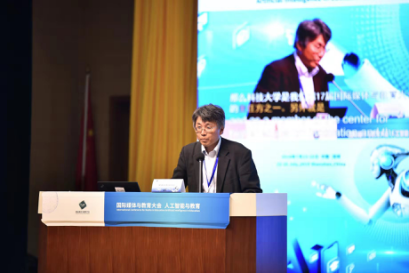
Wakio Oyanagi, the President of JAEMS, expressed his congratulations on the opening of ICoME 2019. He believed that the various activities at the conference would bring new experiences to the guests and deepen their understanding of AI technology.
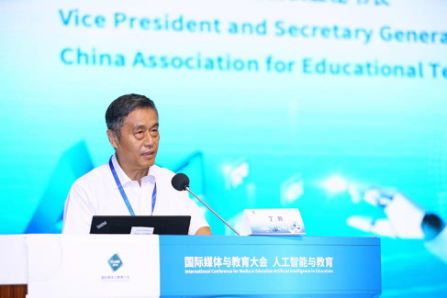
Prof. DING Xin, Vice President and Secretary-General of CAET, introduced the achievements China has made in promoting education informatization. So far, China has built up the world’s largest and most widely-used education information system. The application and integration of AI in education will provide the development of education informatization with a new direction and strong support. The increasing global exchange and cooperation are likely to lead education informatization to a new stage.

Prof. LI Fengliang, Vice-Chairperson of the University Council of SUSTech, mentioned in his opening speech that innovation is regarded as the core of Shenzhen economic miracle while education is the core of innovation. The application of AI in education will bring new ideas to both teaching and learning activities which are likely to promote the sustainable development of students and form a more learner-centered environment. The concept of ‘artificial intelligence + education’ will contribute to accelerating the innovative development of education and city.
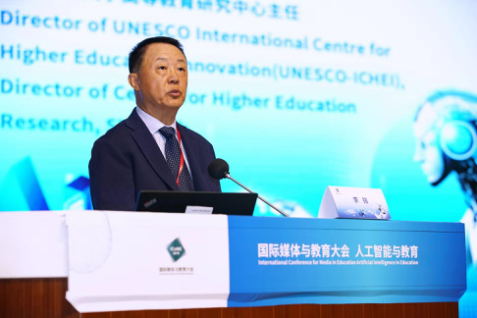
Prof. LI Ming, Director of ICHEI, pointed out that the AI era has created new requirements for talent as well as multiple possibilities for lifelong learning. The construction of online learning platforms is a positive attempt to realize the rational allocation of educational resources and narrow down the digital gap between countries and regions. He believed that the application of AI technology can help to build up a borderless intelligent learning environment, enabling everyone to have access to lifelong learning.

The topic of Prof. Gale M. Sinatra’s keynote speech was ‘The power and peril of AI in education.’ The wide application of AI in education has a positive influence in promoting the public’s understanding of science and technology, to face up to the opportunities and risks brought by AI. At present, AI presents the characters of cross-border integration and human-machine interaction in education, which brings new opportunities for educational reforms and provides a new engine for training innovative talents.

Prof. DING Xin, Vice President and Secretary-General of CAET, introduced the development of educational informatization in China. Under the Intelligence Era, Chinese educational informatization has taken on new characteristics, and educational practitioners should make good use of the opportunities brought about by the Education Informatization 2.0 and achieve innovation in education and teaching through active explorations. It is necessary to learners’ digital learning ability and teachers’ digital teaching ability under a personalized learning environment. As for education managers, it is necessary to enhance their data application ability to realize ‘Educational Governance.’
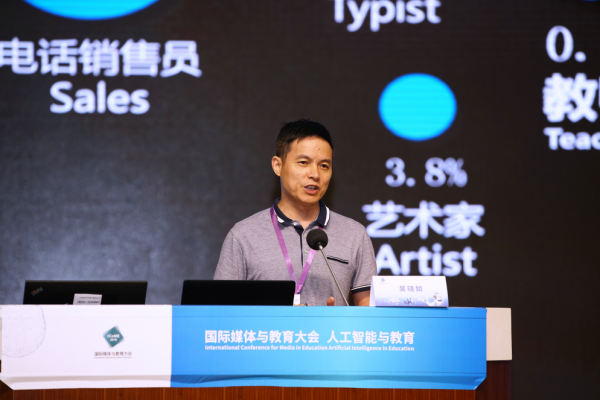
Mr. Wu Xiaoru, Co-Founder and Executive President of iFLYTEK, introduced IFLYTEK’s attempts in using AI to empower education. The classroom revolution is gradually started under the intelligent application of big data in education, which provides strong support for teaching students according to their aptitude. Mr. Wu predicted that the training of new teachers is the key to promote the development of teaching in an intelligent age.
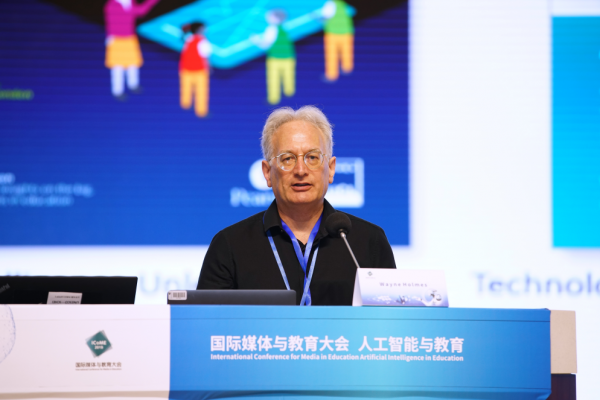
Prof. Wayne Holmes, Assistant Professor in Learning Sciences and Innovation of The Open University of the UK, gave a keynote speech titled ‘AI in Education: Promise and Implication for Teaching and Learning.’ He pointed out that more attention should be paid in interpersonal interaction, scientific ethics, and norms when exploring the integration of AI technology and education.
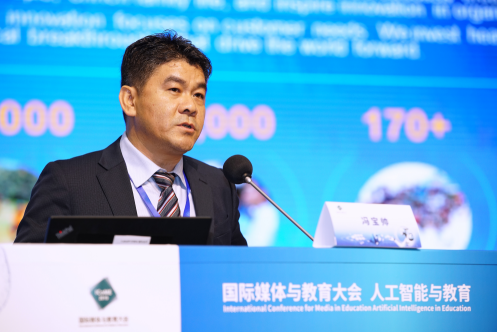
Mr. Bradd Feng, Director of Global Talent Ecosystem Development Department of Huawei, shared his ideas with audience-based his keynote speech ‘An Intelligent World is at Hand, and the Demand for AI Talents is on the Rise.’ He said that the construction of core courses and the reserve of intelligent talents are two key elements to form a talent ecosystem, which will help us to better cope with the opportunities and challenges in the AI era and build a fully connected and intelligent world.
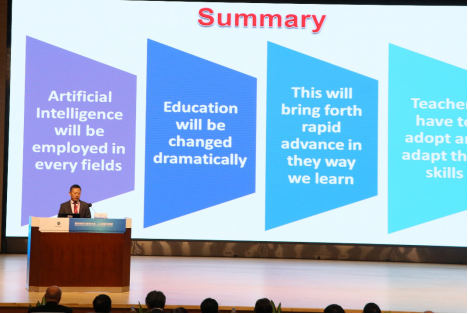
Prof. ZHAO Jianhua, Deputy Director of Centre for Higher Education Research of SUSTech, introduced the concept and practice of educational transformation in the AI age. He believed that the shift from knowledge-based to competency-based teaching paradigm is a way to use AI to drive educational reform and innovation. The training of core qualities and thinking ability is beneficial to talent cultivation, innovation of educational concepts and practices as well as the development of intelligent education in the AI era.
The conference will last three days this year. An Asian-African Forum was specially designed as a platform for the principals and experts from universities in Egypt, Kenya, Uganda, Djibouti, Pakistan, Sri Lanka, Mongolia to have a deeper discussion of using AI to increase lifelong-learning opportunities in developing countries.
The conference will start with keynote speeches, followed by a series of parallel discussions, workshops, and debate. During the conference, exhibitions and workshops will be organized by high-tech companies, as our efforts to bridge the theory and practice. A synthesis report as the main achievements and outcomes of the Conference will be published.
Proofread By
Photo By